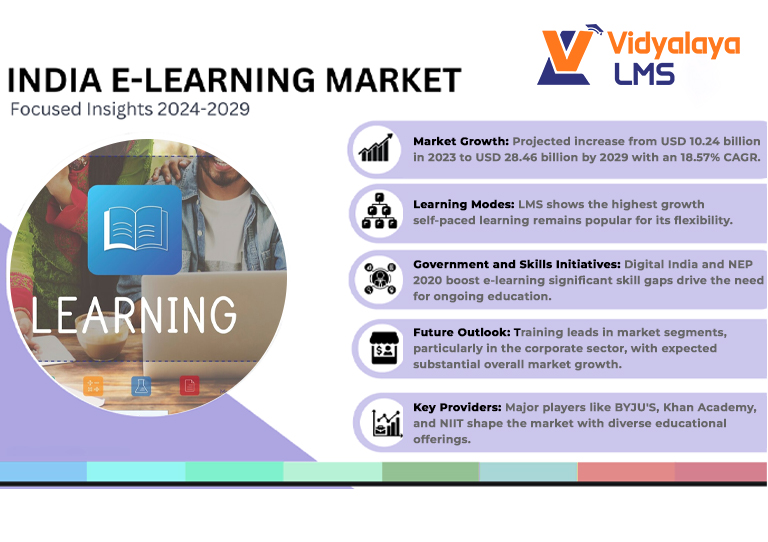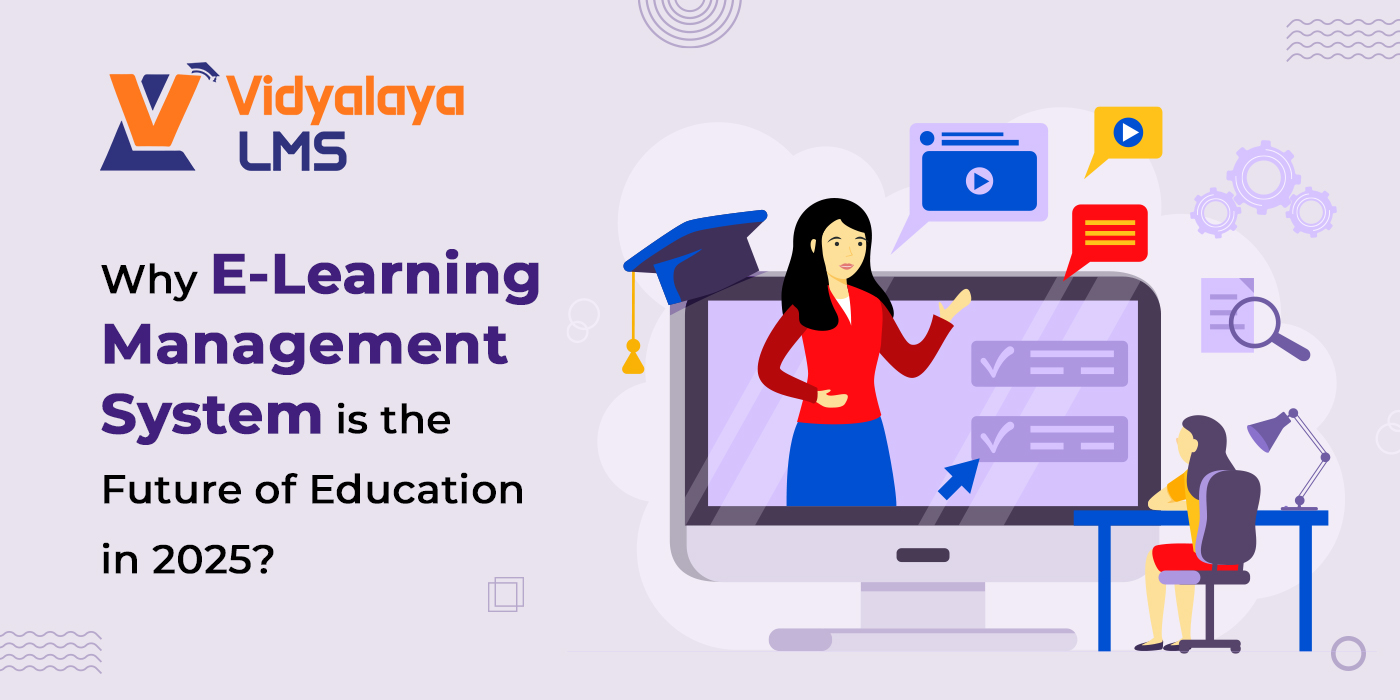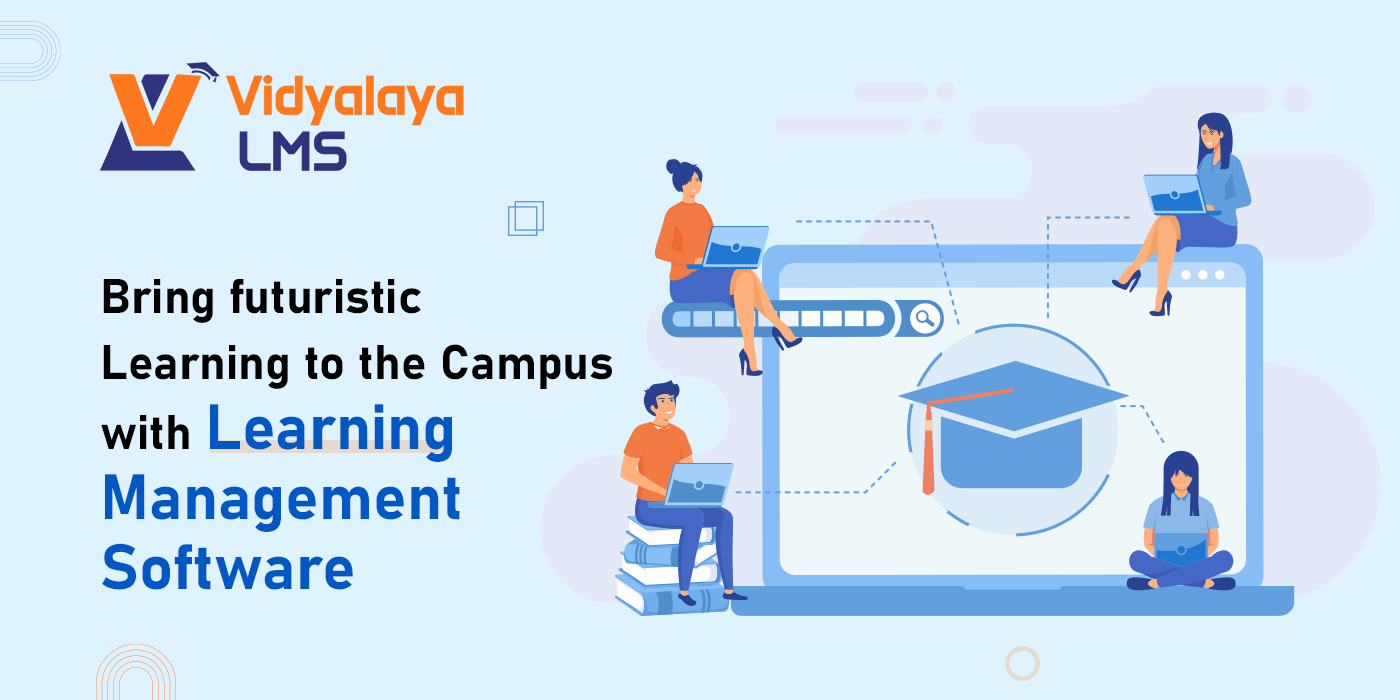Sticking to classroom benches and learning monotonously is no longer the sole option. Nowadays, we can learn from anywhere, whenever you want, as long as you have a smart device and a reliable internet connection. Post-pandemic, embracing eLearning has provided unlimited benefits like improved efficiency, great accuracy, and a comprehensive approach to learning. Thus, the eLearning Management System serves as a necessity rather than a luxury to the modern education system. With the system’s changing needs, products like this come as a saviour for educators and learners. It’s challenging to serve the diversities and opportunities hidden in the future and overcome the existing barriers of place and time. So, it is very interesting to uncover how the E-Learning Management System can be the future of education in 2025 in this blog!
Rise of eLearning in Education and Market Statistics:
Although more than decade-long discovery, eLearning is prominently hitting its peak after the pandemic. Almost every sector like businesses, education, and corporates find it as the best medium to deliver knowledge more flexibly.
In the last few years, the use of eLearning software has skyrocketed and the demand is expected to surge in the coming years. Not only on a global platform, the Indian education system is also embracing this progressive approach and the figure proves the fact!

Indian government initiatives for facilitating distance education programs and the adoption of an e-learning management system have boosted the e-learning market. As per the statistics, the e-learning market is expected to grow with a CAGR of 18.57%. There are several driving factors behind this growth:
Industrial Needs:
Industrial requirements are changing as per the innovations and the critical need for skill development arises. A significant skill gap between graduates cannot meet the increasing industrial demand. To meet this, organizations are providing eLearning-based training and education.
Government Initiative:
Adoption and implementation of NEP 2020 have become one of the main driving factors for the surge in demand for eLearning solutions. With educational institutes also aware of the benefits of e-learning, they are looking into this option.
How can eLearning Software shape the future of Education in 2025?
The eLearning software is enriched with features that are requirements of the new form of education. Adopting learning becomes a prevalent means to transmit knowledge to learners of all age groups. That’s why it is called the future of education. Let’s have a glance at the factors that support this:
1. Adaptive Learning:
While we are living in a data-oriented era, future learners will surely expect adaptive learning that can adjust the learning as per the real-time user data. Depending on the e-learning usage, new concepts will be introduced to keep the interest high. The Vidyalaya software provides the technical infrastructure to collect real-time data and enables the system to act dynamically to change the learning paths, complexity levels, and pace. This personalized approach will improve student engagement and retention and is surely one of the driving factors behind the sustainability of eLearning in the future.
2. One-to-one Online Tutoring:
Contrary to classroom-led learning where many students seek the attention of one teacher, the one-to-one tutoring method focuses on a one-to-one student-teacher ratio. That means the teacher can 100% concentrate on the sole student. Many parents who sought this approach in the pandemic were most satisfied and many of them were willing to pay for this focused technique. In the traditional method, this approach is not feasible to implement because of the scarcity of teachers and infrastructure.
3. AI, VR, and AR to Simulate real-world scenarios:
Latest technology integration such as AI, VR, and AR in the eLearning software is one of the fascinating factors that fetches learners, especially of young age. With the help of AI, these products assemble and analyze the user’s data at every time of interaction. This will greatly help in offering relevant content and assisting learners during the learning based on skills, knowledge, and pace. Other technology integrations like AR and VR make learning more exciting and widen by simulating real-world scenarios. Learners can get first-hand experience by observing real-world simulations which is a different level of experience rather than simply learning from a book or a lecture.
4. Micro-Learning:
The eLearning Management System acts as the delivery platform for microlearning. It divides the learning modules into small chunks to improve knowledge retention and student engagement. With the help of the products, larger content can be cut down into bite-sized learning modules so that learners can access it from anywhere, anytime. This platform becomes the ideal platform for delivering short, focused, digestible pieces of information.
5. Social Learning:
Social learning is the need of the hour and it is based on the approach of learning from human interaction, group dynamics and modern technologies. Social learning relies on learning videos, reading e-books and making it more simple and efficient. This greatly helps to share knowledge, ideas, and ask questions, and learn from each other. Apparently, e-learning contributes to improved engagement, a stronger understanding of study material, and the development of soft skills like leadership, teamwork, communication, etc. among the learners.
6. Learning on-the-go:
Traditional learning method binds the students and teachers inside the four walls of the classroom and in most cases, this cannot be an all-time success method. The eLearning software provides a flexible approach for both to access the learning material from anywhere, anytime, making it realistic to learn on the go. Learners can dip into educational content through smart gadgets with a facility internet connection from anywhere. This flexible approach saves your commute time and money and follows a rigid schedule that hinders to explore your favourite things.
Wrapping Words!
“Learning together, even when we’re apart!” defines the fairytale behind online learning. It offers almost everything that a modern education system is looking for, be it diversity, accessibility, flexibility, cost-effectiveness, or a personalized learning approach.
Vidyalaya aims to digitalize education, gaining an edge day by day to overcome the lacking areas. The constantly increasing demand for eLearning solutions tells the story behind the picture and is expected to continue in the coming years. We are continually upgrading ourselves to discover astounding feats of technology that can revolutionize the ways of learning through our products. So, get ready to step into the future of education with our Learning Management System!











